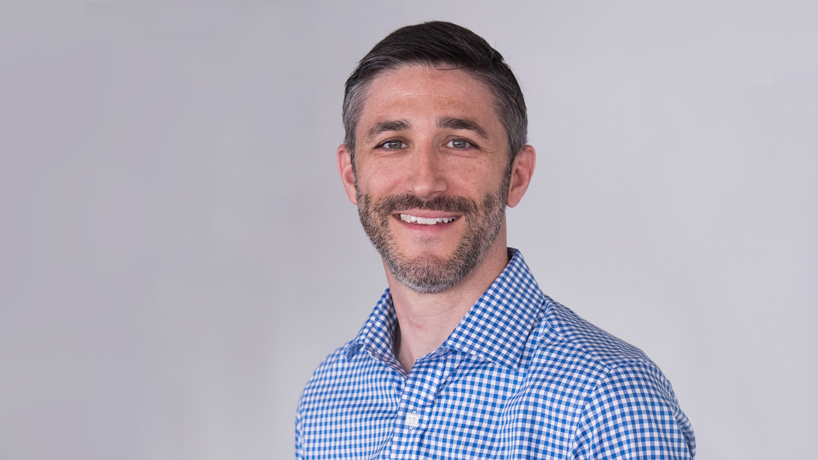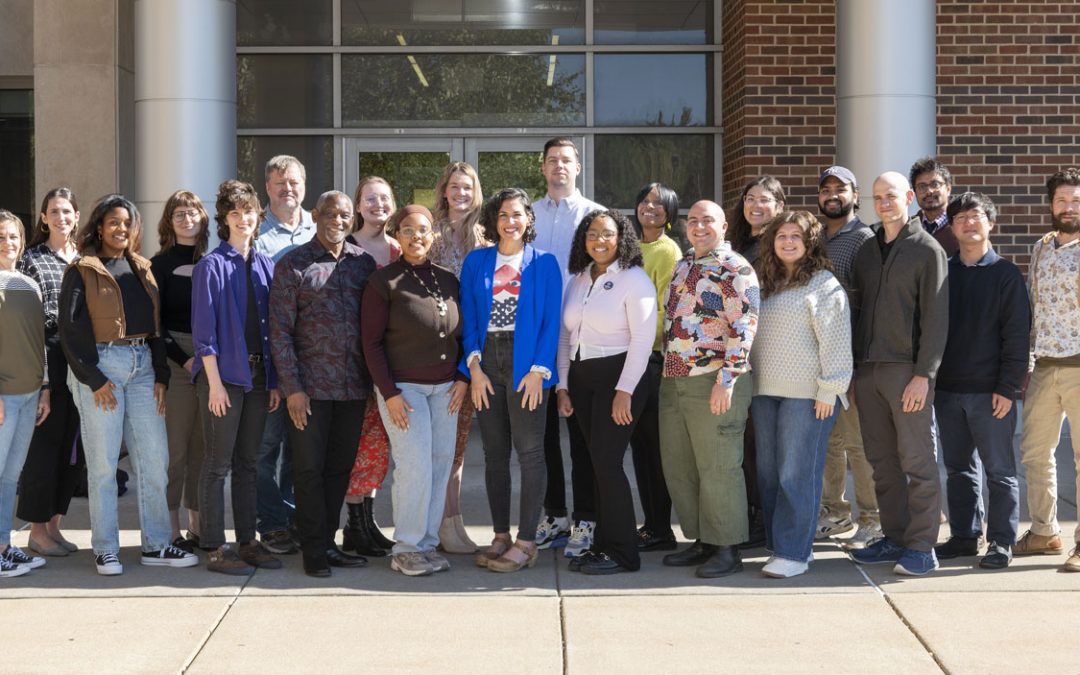
Chris Link has gone from middle school science teacher to director of education products and services at the New York Academy of Sciences all while earning his PhD at UMSL. (Photo courtesy of Chris Link)
Chris Link has dedicated his career to helping students and teachers explore a world of possibilities through a more engaging approach to education.
It’s been a constant as Link, a PhD candidate at the University of Missouri–St. Louis, has transitioned from middle and high school science teacher in Missouri to director of education products and services at the New York Academy of Sciences. It’s an adventure that’s spanned both coasts, counting positions as a science and technology staff development specialist in Silicon Valley and the leader of a charter high school in Brooklyn.
Much of his work has involved rethinking the status quo, including stints preparing teachers to transition to the Next Generation Science Standards – a multi-state effort to overhaul how science classes are taught – and creating a social-justice-focused high school curriculum from scratch. At the Academy, Link works for the organization’s K-12 education arm, the Global STEM Alliance.
“What the GSA does is try to create opportunities to increase the diversity and number of students in the STEM pipeline,” he said.
In practice, that means creating in-person and virtual education programs such as after-school mentoring for high-needs and at-risk youth. Link is particularly proud of a virtual program for gifted students that partners with companies like Regeneron Pharmaceuticals and STEM professionals who serve as mentors to create challenges for students that are based on real-world events.
“We put the challenge out to our network of middle and high school students, and then they work together to create a solution,” Link said. “The mentors help guide their research, help them if they get stuck and keep them moving. The students create pretty impressive solutions to these challenges.”
For someone who has spent so much time trying to transform STEM education, it’s surprising that Link almost followed another career path. In high school, his interest in another field was piqued by a Newsweek article about a forensics lab in Tennessee – provocatively titled “The Body Farm.”
“I read that, and I thought I wanted to be a forensic scientist,” Link said. “They were testing equipment for the FBI so they could better understand murder scenes. I thought it was an interesting way to apply scientific research processes.”
Link started working toward a BS in biology at Southern Illinois University, intending to work in forensic science. Then CBS premiered “CSI: Crime Scene Investigation,” which was an instant hit. He had a hunch that the job market would soon be flooded and decided to pivot.
“I always felt like I could be a good teacher,” Link said. “I always enjoyed my charismatic teachers who kept me inquisitive and kept my attention, and I thought I could be that person for someone else.”
After earning his teaching certificate, Link landed a job teaching at Hazelwood West Middle School. He would go on to teach at Hazelwood Central High School, too. During that time, he made connections that would eventually lead to pursuing a PhD in teaching and learning practices with an emphasis in curriculum and instruction at UMSL.
Link first met Phyllis Balcerzak around 2010 while he was completing a master’s degree in biology for educators at Washington University in St. Louis. Balcerzak led the WUSTL program at the time but would later go on to join the UMSL College of Education.
The next UMSL connection was forged around 2012 while participating in a focus group for the Next Generation Science Standards, a new approach to teaching science that some states were getting ready to adopt. Through working with other educators to understand the new science standards, Link met Curators’ Distinguished Teaching Professor Charles Granger, who was leading the group.
The preparation for NGSS dovetailed nicely with the professional development work Link had taken on in addition to his teaching duties. He was leading district-level professional development initiatives in Hazelwood. It was exciting to help teachers translate the content to the classroom.
“I realized what I wanted to do was help educators apply research and philosophy into their instruction,” he said. “I felt the best way to do that was to get my PhD in education.”
A major life change shortly thereafter gave Link the opportunity to pursue that goal full time. His wife was working on her PhD in clinical psychology and took an internship at the Palo Alto VA Medical Center in California. That’s when he moved out of the classroom to be a development specialist with the Redwood City School District.
“What I really liked about this position, the reason this role was perfect for me, was I got to work with teachers full time,” he said. “I got the best of both worlds. I was able to build my skills with developing professional learning opportunities for teachers, and I was able to have interactions with students while supporting teachers in the classroom.”
Work toward implementing NGSS continued on the West Coast, as Link took it upon himself to figure out how the district would transition to the new standards. Despite a rocky start for Common Core, Link was positive about NGSS.
He feels, at its core, science is about asking questions and continually evolving understandings of new ideas. Classic teaching models – recitation of facts and teaching to the test – often suck the curiosity out of a room.
“What I found exciting about NGSS is that it puts teachers into the role of facilitator, instead of the knower and disseminator of knowledge,” Link said. “To teach NGSS effectively is to give students the reins and help guide their process, not lead the process.”
That might challenge some parents’ ideas about how a classroom should be run, but Link has seen the results. When students are able to ask questions freely and experiment, they’re more engaged. They also learn how to think critically, collect data and conduct investigations. Link said that approach also helps teachers.
“Teachers are in the trenches with students as they’re grappling with their own preconceptions of a concept or a phenomenon,” he said. “Teachers can determine what the misconceptions are, so that they can work together to address them.”
His wife’s post-doctorate work at Weill Cornell Medicine took Link back across the country to New York, where he worked at a new charter school before coming to the Academy. At Brooklyn Ascend High School, Link shaped the curriculum from the ground up – incorporating real-life touchstones such as Black Lives Matters – as director of curriculum and instruction.
Somehow, Link found time to continue his doctoral work between two long-distance moves, work and family. His PhD is only short a completed dissertation, and he credits mentors such as Balcerzak, Granger and Natalie Bolton, associate professor of education, with getting him to the finish line.
“They check in with me once in a while to keep me moving,” he said. “I had my second child about six weeks ago, so in the midst of writing, in the midst of working, I also have two kids in diapers. Having their support has been incredibly helpful.”














